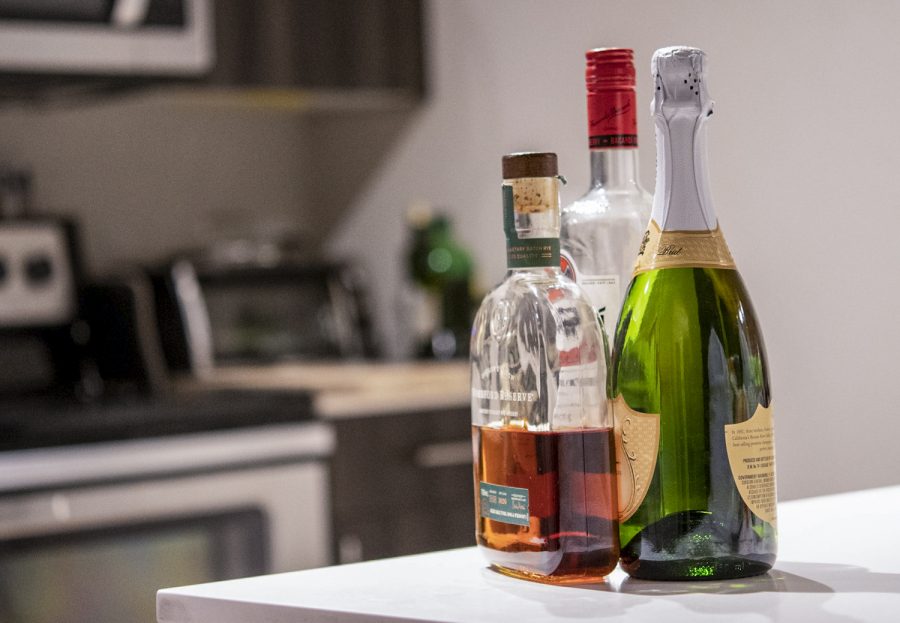WSU students can use simple tricks to improve health, safety while drinking
Alcohol use has increased following COVID-19; never drink on an empty stomach
Always know how much you are drinking and what is in a drink. Keep caps in your pocket or alternate between alcoholic and nonalcoholic beverages.
October 31, 2021
Simple practices could help WSU students mitigate alcohol-related harm caused by increased drinking and the return to campus.
Unrestricted alcohol use can create negative consequences for students; however, it is unrealistic to expect students not to drink, said WSU psychology professor Susan Collins.
In a 2016 survey of 3,168 WSU students, 81.7 percent of WSU students said they drink, according to the Cougar Health Services website.
People are also drinking more now than they did before the pandemic. About 23 percent of adults reported drinking more alcohol now than they did a year ago, according to a survey by the American Psychological Association.
Instead of focusing on ways to prevent student drinking altogether, it is more effective to educate students on how to do it in a safe way, Collins said.
Incoming students can feel pressure to drink in social situations. Drinking frequently with other students can lead to most of their social experience revolving around drinking, said Benjamin Ladd, WSU psychology associate professor.
“It’s kind of the expectation that there’ll be drinking, and so that feeds into itself,” Ladd said.
Remote learning led to reductions in alcohol use for a lot of students, in part because they were at home, he said.
Student residential status — whether students are living on campus or not — is one of the better predictors of alcohol use. Moving away for college is associated with increased drinking, Ladd said.
“Students are returning to campus. They’re excited. They’re getting back into the campus life activities and into drinking. There is almost this feeling that they need to make up for lost time,” Ladd said.
Residential status combined with the increased stress and isolation for some people — particularly those who are most at risk already — has led to increases in drinking, Collins said.
Many people drink to experience benefits like enhanced social experiences, but people can begin to experience the negative consequences of drinking when it interferes with other aspects of life, she said.
These consequences can include bad decision-making, blackouts, injury, poor academics and missing class and other events, Ladd said.
About one in four college students report having academic difficulties like falling behind on work or missing class due to drinking, according to the National Institute for Alcohol Abuse and Alcoholism.
Problems can also arise when students use alcohol as a coping mechanism, which is one of the top three reasons why college students drink, according to a study Collins published in 2014. This behavior is associated with problematic drinking habits, as it can lead to a reliance on alcohol.
“Are we getting the effects we want out of that substance or what we are putting in our body?” Collins said. “If not, let’s monitor it and figure out how we get what we want out of our alcohol use without experiencing the negative consequences, or alcohol-related harm.”
Students can employ a few simple strategies to ensure they have a good drinking experience.
Make a plan and set a limit before going out
Be sure you have a plan in place, Ladd said. If you know you are going to be drinking heavily, it is good to be in a safe place like a friend’s house where you can get a ride home or sleep for the night.
Never drive under the influence, Collins said.
Pace yourself
Go out with people who are looking out for you and who will be checking in, Collins said. Track your drinking; it is easier to black out if you are not paying attention to how much you are consuming.
Blood alcohol content does not peak until 60 minutes after someone starts drinking. In that 60 minutes, they can consume a lot more alcohol, pushing them over the limit of how intoxicated they want to be, Ladd said.
Know what is in your drink and how much you are drinking
Avoiding punches or mixed drinks people hand you is important because anything could be in a drink that you did not watch someone make, Collins said.
Standard drinks can be easily tracked by keeping the caps in your pocket or by alternating between alcoholic and nonalcoholic drinks, she said.
Never drink on an empty stomach
When you drink on an empty stomach, it spikes your blood alcohol content faster than if you ate before, meaning you will get drunk faster. Drinking on an empty stomach also causes a drastic dip into the depressant effects of alcohol, Collins said.
If a person has a couple of drinks, they may feel “buzzed” or have heightened energy. Once people hit the legal limit, the depressant effects of alcohol start to set in, making them feel tired and lose coordination, Collins said.
If you drink on an empty stomach it gets you intoxicated faster, but it also impacts your liver more. Right now, there is an increase in alcohol-related liver disease among young women, Collins said.
It also means that you are not going to be around for a lot of the night because you might black out faster.
Take a break
Give yourself a break from drinking. This is especially important for those who drink daily. Taking even one day a week off from drinking breaks the cycle so your body does not become dependent on alcohol, Collins said.
Simply taking a day off can prevent a person from needing alcohol to feel normal and suffering severe withdrawal symptoms, she said.
Finding engaging interests like sports, clubs and hobbies that do not emphasize or revolve around drinking can help create more balance, Ladd said.
“It’s not just about getting people to drink less, it’s also about getting them involved in finding other ways to get the things they get out of drinking,” Ladd said.
For those who drink as a coping mechanism, having alternative strategies for dealing with problems is important, he said.
Counseling and Psychological Services provides some effective treatments including motivational interviewing strategies for those who want to change their drinking habits, Ladd said.
Students can assess the pros and cons of drinking and how it fits into their life, really thinking about how they can make a change, he said.
CAPS also offers cognitive behavioral treatments, which involve skill building that focuses on things like drink refusal and knowing how to say no to somebody, which is not as easy as it seems, Ladd said.
Parents and family can help prepare students for experiences with alcohol
“Instead of using fear-based messaging, talk about loving yourself and loving your body. Really teaching our kids to love themselves and respect themselves, to care about what they put in their bodies and how that affects them,” Collins said.
When people are properly educated and trusted to make the right decisions, they usually will make good choices, she said.
Many students are able to consume alcohol in a way that does not majorly impact their lives. The idea is to minimize students having a bad experience drinking, Ladd said.
When there is a population of students who are aware of how to drink responsibly and are looking out for each other, then drinking can be done safely and responsibly, he said.









